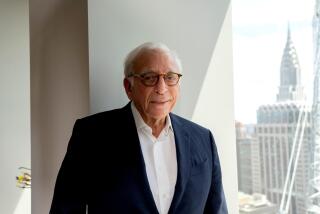SEC Chief Calls for Majority of Fund Directors to Be Independent
- Share via
In an effort to make mutual funds more responsive to their shareholders, Securities and Exchange Commission Chairman Arthur Levitt on Monday proposed strengthening the role of “independent” directors on fund boards.
Initial industry reaction was tempered, however, as managers said they’re already following many of his ideas.
For years, mutual fund boards have been criticized for neglecting the interests of their investors--for instance, by failing to lower fund expenses at an unprecedented time of prosperity in the industry.
Under current rules, at least 40% of a mutual fund’s board must be made up of independent directors who don’t have ties to the fund, its investment advisor or its underwriter--ties that may lead to conflicts of interest.
Levitt wants to increase that requirement to a majority. He also called for three other measures to ensure that independent directors are truly “independent” and effective.
“They need to have the tools, the access and the power to faithfully fulfill their legal duty and moral mandate as the shareholder’s representative,” he said at an annual Investment Company Institute conference in Palm Desert.
While many industry observers say the plan represents a positive step, some question how effective Levitt’s proposals would be.
At least two of Levitt’s four proposals have already been embraced by a majority of fund companies, industry executives note.
Although it’s true that in general only 40% of a fund’s board must be composed of independent directors, that’s not always the case.
When a fund’s principal underwriter is affiliated with the investment advisor--which is typical--independent directors must represent a majority of the fund’s board, notes Craig Tyle, general counsel for ICI, the industry’s chief trade group.
Also, in an effort to ensure the independence of board members, Levitt called for all new independent directors to be nominated by independent directors.
But the SEC already requires this of all funds that charge 12b-1 fees to pay for marketing expenses. According to Chicago-based fund tracker Morningstar Inc., 63% of funds charge such a fee.
“The industry is substantially on the same page already with those two proposals,” said Geoff Bobroff, an independent industry consultant in East Greenwich, R.I.
Levitt called for two other requirements: that all outside counsel for directors be independent of the management and that shareholders be provided with more “specific” information detailing the independence of their directors.
John Markese, president of the American Assn. of Individual Investors in Chicago, notes that although Levitt’s plan offers no guarantees, “at least we’ll have a structure in place where independent directors are asking, ‘Why aren’t expenses going down?’ ”
Indeed, though total fund assets have exploded in the last decade, expense ratios haven’t benefited from economies of scale. Instead, the average fund expense ratio has gone up, from 1.16% in 1989 to 1.35% in 1999, according to Morningstar.
More to Read
Inside the business of entertainment
The Wide Shot brings you news, analysis and insights on everything from streaming wars to production — and what it all means for the future.
You may occasionally receive promotional content from the Los Angeles Times.










